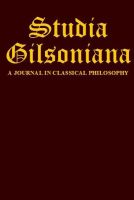Aquinas’ Attribution of Creation Ex Nihilo to Plato and Aristotle: The Importance of Avicenna
Aquinas’ Attribution of Creation Ex Nihilo to Plato and Aristotle: The Importance of Avicenna
Author(s): Seth KreegerSubject(s): History of Philosophy, Philosophical Traditions
Published by: International Étienne Gilson Society
Keywords: Aquinas; Creation; Aristotle; Plato; Avicenna
Summary/Abstract: There is some debate among interpreters of Aquinas as to whether he attributed a doctrine of creation to Plato and Aristotle. Mark Johnson has noted many texts where Aquinas does appear to attribute to Plato and Aristotle an understanding of creation. Yet, an initial glance at Summa Theologiae I.44.2 would suggest he did not. This paper first examines what various interpreters of Aquinas have had to say on the matter. Secondly, it argues that Summa Theologiae I.44.2, taken in context with the proceeding article and De Potentia III.5, need not be read as denying such a doctrine to Plato and Aristotle. Thirdly, this paper concludes that because Plato and Aristotle do not actually possess doctrines of creation, they cannot be the chief sources for Aquinas’ own thought on this matter. Instead, to attribute creation to Plato and Aristotle, Aquinas interprets them through Avicenna. Thus, Avicenna is the chief source for Aquinas’ understanding of creation.
Journal: Studia Gilsoniana
- Issue Year: 11/2022
- Issue No: 3
- Page Range: 377-410
- Page Count: 34
- Language: English

